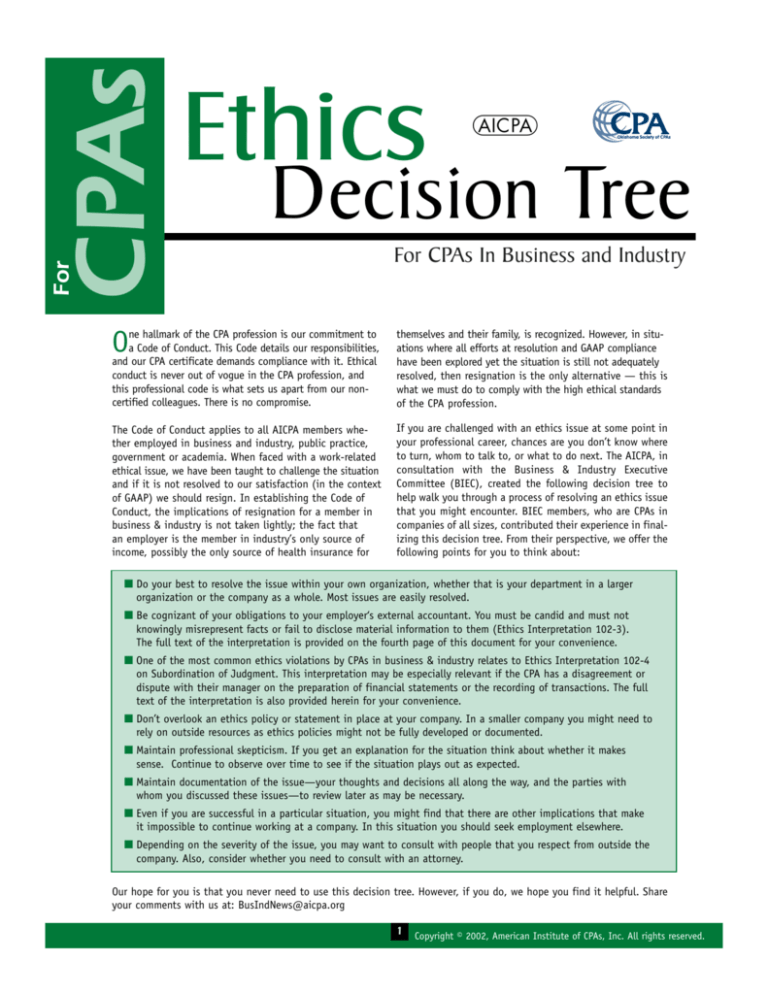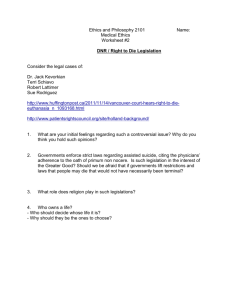
CPAs
For
Ethics
D
Decision Tree
For CPAs In Business and Industry
O
ne hallmark of the CPA profession is our commitment to
a Code of Conduct. This Code details our responsibilities,
and our CPA certificate demands compliance with it. Ethical
conduct is never out of vogue in the CPA profession, and
this professional code is what sets us apart from our noncertified colleagues. There is no compromise.
themselves and their family, is recognized. However, in situations where all efforts at resolution and GAAP compliance
have been explored yet the situation is still not adequately
resolved, then resignation is the only alternative — this is
what we must do to comply with the high ethical standards
of the CPA profession.
The Code of Conduct applies to all AICPA members whether employed in business and industry, public practice,
government or academia. When faced with a work-related
ethical issue, we have been taught to challenge the situation
and if it is not resolved to our satisfaction (in the context
of GAAP) we should resign. In establishing the Code of
Conduct, the implications of resignation for a member in
business & industry is not taken lightly; the fact that
an employer is the member in industry’s only source of
income, possibly the only source of health insurance for
If you are challenged with an ethics issue at some point in
your professional career, chances are you don’t know where
to turn, whom to talk to, or what to do next. The AICPA, in
consultation with the Business & Industry Executive
Committee (BIEC), created the following decision tree to
help walk you through a process of resolving an ethics issue
that you might encounter. BIEC members, who are CPAs in
companies of all sizes, contributed their experience in finalizing this decision tree. From their perspective, we offer the
following points for you to think about:
I Do your best to resolve the issue within your own organization, whether that is your department in a larger
organization or the company as a whole. Most issues are easily resolved.
I Be cognizant of your obligations to your employer‘s external accountant. You must be candid and must not
knowingly misrepresent facts or fail to disclose material information to them (Ethics Interpretation 102-3).
The full text of the interpretation is provided on the fourth page of this document for your convenience.
I One of the most common ethics violations by CPAs in business & industry relates to Ethics Interpretation 102-4
on Subordination of Judgment. This interpretation may be especially relevant if the CPA has a disagreement or
dispute with their manager on the preparation of financial statements or the recording of transactions. The full
text of the interpretation is also provided herein for your convenience.
I Don’t overlook an ethics policy or statement in place at your company. In a smaller company you might need to
rely on outside resources as ethics policies might not be fully developed or documented.
I Maintain professional skepticism. If you get an explanation for the situation think about whether it makes
sense. Continue to observe over time to see if the situation plays out as expected.
I Maintain documentation of the issue—your thoughts and decisions all along the way, and the parties with
whom you discussed these issues—to review later as may be necessary.
I Even if you are successful in a particular situation, you might find that there are other implications that make
it impossible to continue working at a company. In this situation you should seek employment elsewhere.
I Depending on the severity of the issue, you may want to consult with people that you respect from outside the
company. Also, consider whether you need to consult with an attorney.
Our hope for you is that you never need to use this decision tree. However, if you do, we hope you find it helpful. Share
your comments with us at: BusIndNews@aicpa.org
1
Copyright © 2002, American Institute of CPAs, Inc. All rights reserved.
Ethics Decision Tree
Identify Issue
NOTE: If the issue related to a disagreement or dispute relating to the
preparation of financial statements or the recording of transactions, the
CPA should refer to AICPA Ethics Ruling 102, specifically Interpretation
102-4 on “Subordination of Judgment” for guidance (attached).
Does company have an
Ethics policy and
process in place to give
you guidance?
For CPAs in Business & Industry
No
Consider following
this decision tree
Yes
Give strong consideration to following the
company’s guidance. If you choose to
deviate, be prepared to justify why you
deviated, and document it.
Do you
need to take
additional
steps?
No
2
Yes
Talk to your
manager
Was the
result
satisfactory?
Yes
Take action and consider whether the
issue is resolved
1
No
Yes
2
No
Review the decision tree and take your discussion
to the next higher level in the organization.
Repeat as appropriate.
Talk to another
sr. exec that you
trust
Was the result
satisfactory?
Yes
1
No
Talk to the
company’s
Ethics
Committee if
one exists
Was the result
satisfactory?
Was the result
satisfactory?
Yes
Yes
Do you
need to take
additional
steps?
No
No
3
2
Yes
No
Talk to the
Audit Comm
of the Board if
one exists.
If not, talk to
the BoD
Was the result
satisfactory?
Yes
No
3
Notice to Readers
This material is designed to provide illustrative information with respect to the subject matter covered. It does not establish standards or
preferred practices. The material has not been considered or acted upon by senior technical committees or the AICPA Board of Directors and
does not represent an official opinion or position of the AICPA. It is provided with the understanding that the author and publisher are not
engaged in rendering legal, accounting, or other professional service. If legal advice or other expert assistance is required, the services of a
competent professional person should be sought. The author and publisher make no representations, warranties or guarantees as to, and assume
no responsibility for, the content or application of the material contained herein, and expressly disclaim all liability for any damages arising out
of the use of, reference to, or reliance on such material.
D
2
For CPAs in Business & Industry
1
When speaking with your manager or a more
senior executive, carefully gauge your satisfaction
with the response. Bear in mind that your
manager or other executive might be a party
to the situation that you have observed, so
approach the response with the necessary
degree of professional skepticism.
2
It appears you have successfully managed your
way through this challenge. It is recommended
that you maintain and secure all documentation
related to this matter as described in your
records retention policy or as recommended by
your legal counsel in case the issue resurfaces.
Has the organization’s processes, internal control
system, and culture changed in response to
this matter? Are these changes sufficient to
minimize the recurrence of a challenge like
this one? Evaluate your answers and consider
consulting with management, an outside mentor
or other neutral party whom you respect.
3
ETHICS HOTLINE
The AICPA Professional Ethics Team
maintains a hotline for members
to make inquiries about the Code
of Conduct, and for advice when
facing situations that challenge
their professional ethics. To
access the Ethics Hotline dial
1-888-777-7077 and follow the
prompts to be routed to the
Ethics team.
Consider whether it is appropriate for you to
continue your employment at this company.
Consider the severity and implications of the
issue you have identified and whether it
should be reported to the outside accountants,
regulatory agency, bank or other lending
institution, owner or investor committee,
BoD, or another party.
D
3
CPAs
Notes to Ethics Decision Tree
CPAs
ET Section 102*
Integrity and Objectivity
.01–Rule 102—Integrity and objectivity. In
the performance of any professional service, a
member shall maintain objectivity and integrity,
shall be free of conflicts of interest, and shall
not knowingly misrepresent facts or subordinate
his or her judgment to others.
[As adopted January 12, 1988.]
.04–102-3—Obligations of a member to his or
her employer‘s external accountant. Under rule
102 [ET section 102.01], a member must maintain
objectivity and integrity in the performance of a
professional service. In dealing with his or her
employer's external accountant, a member must
be candid and not knowingly misrepresent facts
or knowingly fail to disclose material facts. This
would include, for example, responding to specific
inquiries for which his or her employer's external
accountant requests written representation.
[Effective November 30, 1993.]
.05–102-4—Subordination of judgment by a
member. Rule 102 [ET section 102.01] prohibits
a member from knowingly misrepresenting facts or
subordinating his or her judgment when performing
professional services. Under this rule, if a member
and his or her supervisor have a disagreement or
dispute relating to the preparation of financial
statements or the recording of transactions, the
member should take the following steps to
ensure that the situation does not constitute
a subordination of judgment:
disclosure in the financial statements, as
proposed by the supervisor, represents the
use of an acceptable alternative and does not
materially misrepresent the facts. If, after
appropriate research or consultation, the member
concludes that the matter has authoritative
support and/or does not result in a material
misrepresentation, the member need do
nothing further.
2 If the member concludes that the financial
statements or records could be materially
misstated, the member should make his or
her concerns known to the appropriate higher
level(s) of management within the organization
(for example, the supervisor‘s immediate superior,
senior management, the audit committee or
equivalent, the board of directors, the company‘s
owners). The member should consider documenting
his or her understanding of the facts, the
accounting principles involved, the application
of those principles to the facts, and the parties
with whom these matters were discussed.
3 If, after discussing his or her concerns with
the appropriate person(s) in the organization,
the member concludes that appropriate action
was not taken, he or she should consider his or
her continuing relationship with the employer.
The member also should consider any responsibility that may exist to communicate to third
parties, such as regulatory authorities or the
employer‘s (former employer‘s) external accountant.
In this connection, the member may wish to
consult with his or her legal counsel.
1 The member should consider whether (a) the
entry or the failure to record a transaction in
the records, or (b) the financial statement
presentation or the nature or omission of
4 The member should at all times be cognizant
of his or her obligations under interpretation
102-3 [ET section 102.04].
*AICPA Professional Standards, Code of Professional Conduct
www.aicpa.org
To view this document electronically or to view other ethics materials for
CPAs in business and industry, please visit
http://www.aicpa.org/members/div/ethics/industry.htm
D
4







